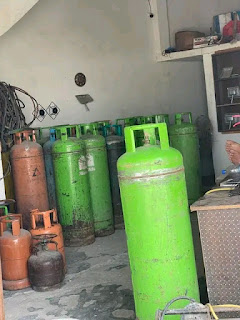💡 NaijaLPG | We build your LPG Gas Plant from scratch — to your exact taste and safety standard ⚙️ |
Turnkey Design • Installation • Licensing • Maintenance 🔧 |
Get started today — Contact Us! 📞 |
Your trusted LPG project partner 💼
A perfect and well written sales record book can actually determine how far a business will go. Every LPG gas retailers need a record for every transactions for each day. Having a sales record book is so important, as it will help you to know your profit and loss, including expenses, spendings for each day, week or month.
As a LPG gas reseller, your sales record book should contain important details such as initial gas tank list in Kg, selling price, Kgs sold for each day, expenses, leakages, profit and Loss.
For LPG gas retailers, your sales record book should look as this:
NOTE: Always have separate books for each LPG containers or cylinders in your shops. In other book, should contain only customers information and price per kg purchased.
1ST RECORD BOOK
LPG Per Cylinder Bottles:
For example, if you owned a LPG retail reseller shop, each gas container or cylinder bottles, mostly the 50kg or below, should have a record book for the level/amount of LPG gas presently filled inside it, for resale. That is, if you have two 50kg cylinder bottles, depending on your capital, you can decide to refill just 30kg in each for resale. So, the LPG content in each cylinder bottles most be recorded for proper analysis of profit and lost at the exhaust of any particular cylinder bottle.
DATE:
This should contain records of date of which each 50kg of cylinder bottles in your shops was refilled.
RECORD BOOK 2
This record book, also written on a separate book, should contain customers information - including kg sold, date (which purchase was done), shortages (mistakes such as leakages, incomplete or inaccurate refilling). Here as explained:
CASH BALANCE: Also known as "money change" by our Nigerians. This is record of customers who have changes remaining/left to collect from you. You should always record this just in case a customer return for his/her money balance later in the day, or most time, it take customers weeks to ask for this balance. It is best for you as a sales staff to always keep this type of money in a separate accounting book; so to prevent total miscalculation of profit, loss with inclusion of customers balance or change.
KG SOLD: This is the total kg sold to a particular customer at a given time. This record book is needed per each cylinder bottles/containers refilled for resale. So, at the end of each exhausted cylinder bottles/containers, you can easily calculate your profit or loss for each gas containers.
CUSTOMERS NAME & PHONE NUMBER: This is records of names of patronizers. This book is needed, as discussed earlier on, in case of money balance or change from customers, this record book helps you as a sales staff to trace back past transactions.
RECORD BOOK 3
EXPENSES: This record books contains spendings for goods and services in your LPG business. This includes merchandise expenses, fuel expenses to run generators, repair and maintenance expenses, Electrical expenses, and so much more.
This is calculated based on each day transactions. Today expenses and spendings should not be added or calculated with tomorrow's. You should be able to get your profit and loss, then minus the expenses and spendings at each day ending.
RECORD BOOK 4
PROFIT AND LOSS RECORD BOOK: This is total kg sold for each day, together with any profit sharing based on price per kg. Truth is that, don't expect alot profit from LPG gas you've sold. There are many factors that comes in to create profit for your LPG business. Such as selling at increase price, or cheating customers, ordering from LPG supplies on discounted price, logistics and extra services like home delivery.
LPG business requires the right business plan. Miscalculation can occur. Profits is hardly experienced, losses comes with lack of proper planning. So, don't not expect extra money apart from the ones you are reselling. For example, if you refill a 50kg gas cylinder for #25,000 - don't expect to see gains of extra #5,000. Unless you've refilled the 50kg at discounts of #20,000 from a LPG distributor. Gains from LPG business is not much, and losses comes from mistakes from gas leakage or inaccurate refilling. Only the right LPG suppliers, logistics and price per kg - can determine your profit for LPG business.



